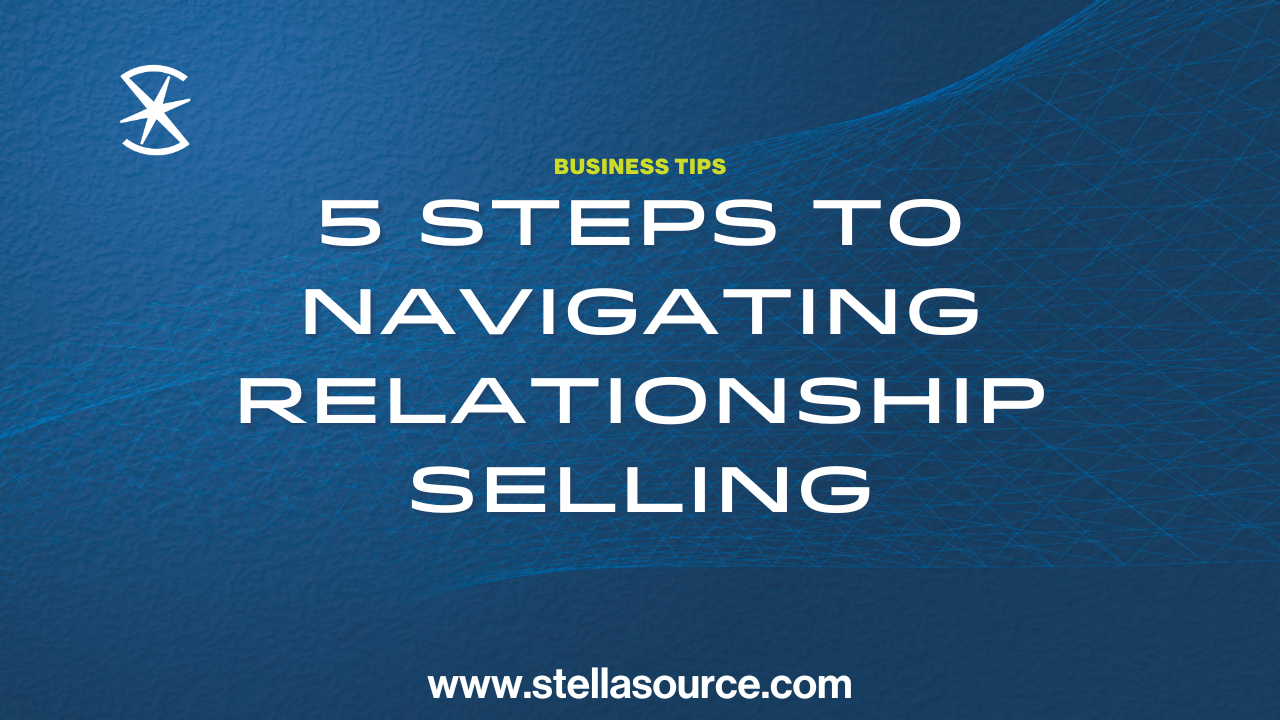In the dynamic and competitive world of the metals industry, where technical expertise and precision matter, relationship selling has emerged as a crucial strategy for success. Building lasting partnerships and fostering trust with clients goes beyond mere transactions; it’s about understanding their unique needs, offering tailored solutions, and becoming a trusted advisor in their metal-related endeavors. In this blog, we’ll delve into relationship selling in the metals industry and explore the key components that contribute to its effectiveness.
The metals industry operates within a realm of intricacies that demand more than just product knowledge. While the quality and specifications of metals are undoubtedly essential, the foundation of successful transactions rests upon cultivating robust relationships. Buyers are not just seeking metals; they are seeking reliable partners who understand their requirements and can provide solutions that align with their goals. This is where relationship selling shines.
Building Trust and Credibility with Clients in a Technical Industry
The cornerstone of relationship selling in the metals industry is understanding customer needs at a granular level. This begins with conducting thorough research on the industries your clients serve, as well as the specific requirements for different metal applications and use cases. Armed with this knowledge, you can tailor your offerings to precisely fit their needs. Moreover, developing expertise in client pain points and challenges enables you to position yourself as a problem solver rather than just a vendor.
1. Establishing Strong Customer Relationships
Personalized communication is a linchpin of relationship selling. By taking the time to understand your clients’ individual preferences and communication styles, you can build rapport that transcends mere business transactions. Regular follow-ups and check-ins go a long way in maintaining engagement and keeping your company at the forefront of their minds. Additionally, industry events and trade shows provide valuable opportunities to forge connections and expand your network. A customer relationship management system can support your sales team by allowing them to keep track of interactions as well as remind them to check in with customers.
Mapping out the customer journey and creating touch points along the way for your sales team will also support the team’s efforts in deepening relationships.
2. Consultative Selling in the Metals Industry
The metals industry often involves intricate technical details that can overwhelm clients. By adopting a consultative selling approach, you can offer guidance on metal selection, specifications, and customization. This not only showcases your expertise but also helps clients make informed decisions. The value you bring through your insights and collaborative problem-solving can set you apart from competitors.
Consultative selling is also known as needs-based selling and is an approach where your sales team are advisers more than salespeople. Instead of focusing on selling a specific product, your sales representatives offer varying solutions to customers based on their specific needs and pain points.
In training a sales team, teaching them to use a consultative method instead of a solution method can give them an advantage as customers will deem your team more trustworthy. The consultative method meets customers where they are in the sales journey. It is a sales skill worth training and reinforcing.
Sales representatives need to develop an understanding of a customer’s pain points and needs by: actively listening, asking questions, being objective, focusing on solutions (rather than products or features), and providing customers with information and resources without pushing a specific product. In this way, your team will develop deeper bonds with their customers and prospective customers and be seen as the go-to expert which can lead to both sales and referrals.
3. Handling Complex Sales Cycles
Patience is a virtue in relationship selling, especially in the metals industry where sales cycles can be complex and lengthy. Navigating these cycles requires persistence and a deep understanding of your clients’ decision-making processes. Overcoming objections and hurdles becomes more manageable when you’re armed with strategies that address their concerns comprehensively. Internal coordination and collaboration ensure that promises made during the sales process are seamlessly executed.
Potential Objections
Lengthy sales cycle due to already entrenched vendor relationships, market fluctuations, and production needs can generate an objection from a potential customer of not wanting to establish a new relationship or in the complexity of the sale itself.
3 ways to overcome this objection: emphasize value, case studies, and collaborative planning.
Emphasize Value: Highlight the importance of a thorough sales process in ensuring the right solution for the client’s needs. Emphasize that rushing through decisions can lead to costly mistakes.
Case Studies: Share success stories where taking the time to understand the client’s requirements and navigate the complex sales cycle resulted in long-term benefits, such as improved product quality or cost savings.
Collaborative Planning: Offer a collaborative approach where both parties work together to streamline the sales cycle as much as possible, reducing unnecessary delays and ensuring timely decision-making.
An additional objection your team might hear is customers having uncertainty due to their own internal decision-making processes. They may have worries about their organization reaching a consensus on what is needed or the proper solution to a problem delaying their ability to purchase.
Using consultative selling, a salesperson can use a discovery phase to understand the customer’s organization. This involves uncovering key decision-makers, their roles, and their preferred communication methods. This information can help align the sales strategy with the client’s internal processes.
Part of developing a relationship and establishing trust also means transparency is important. By providing a clear timeline, indicating key milestones and decision points can help your customers and support them through their internal discussions.
Always providing customization means tailoring the sales process to match the client’s decision-making pace and is helpful when a customer has internal issues at their organization to overcome. Offer options for quicker decisions white emphasizing the benefits of a more comprehensive approach providing specific information for each customer.
Most customers, all of us if truth be told, worry about promises made during the sales process. By collaborating with operations offering continue clear communication and providing references and testimonials to reiterate your credibility you can allay your customers concerns about execution.
4. Customer Retention and Upselling
Relationship selling doesn’t end once the sale is made. In fact, that’s just the beginning. Developing post-sale relationships is essential for securing repeat business. Stay attuned to evolving client needs and seize upselling opportunities by aligning your offerings with their changing requirements. Exceptional after-sales support and service reinforce your commitment to their success.
Continuous Training and Education
Stay engaged with your clients by offering continuous training and educational resources related to the metals industry. This could include webinars, workshops, and tutorials on topics such as proper handling of metals, industry trends, or new advancements in metal applications. By positioning yourself as a source of knowledge and expertise, you not only add value to their initial purchase but also keep them informed about ways to optimize their operations. This engagement opens doors for suggesting additional products or upgrades based on the knowledge shared.
Feedback and Improvement Initiatives
Actively seek feedback from your clients about their experience with your products and services. Use this feedback to drive improvements and innovations in your offerings. This not only shows that you value their opinions but also demonstrates your dedication to delivering quality solutions. Consider establishing a client advisory board where select clients can provide input on product development and enhancements. This engagement fosters a sense of ownership and partnership, making them more likely to continue doing business with you and trying out new offerings.
Remember, the key to successful post-sale relationship building is to ensure that your efforts are genuine and centered around your clients’ success. By consistently providing value and demonstrating your commitment, you’ll establish a foundation of trust that encourages clients to return for future business and consider expanding their engagement with your company.
5. Cultivating Industry Expertise
The metals industry is constantly evolving, with new technologies and trends shaping its landscape. To be an effective relationship seller, it’s crucial to stay updated on these changes. Attend workshops, webinars, and training sessions to continuously enhance your knowledge. This positions your sales team as trusted advisors who are well-versed in the latest industry developments. Staying up to date with new technology, like Stella Source, can enhance your abilities to work with customers by getting information to them quickly. Time is of the essence when estimating and getting bids.
In the fast-paced and technically demanding metals industry, relationship selling isn’t just a strategy; it’s a necessity. The enduring value it brings to both sellers and buyers is undeniable. By investing in understanding customer needs, building strong relationships, adopting a consultative approach, managing complex sales cycles, retaining customers through upselling, managing expectations, and cultivating expertise, businesses can forge partnerships that stand the test of time. Ultimately, the role of trust and rapport in long-term customer partnerships cannot be overstated. As the metals industry continues to evolve, those who prioritize relationship selling are poised to thrive in this challenging yet rewarding sector.



0 Comments